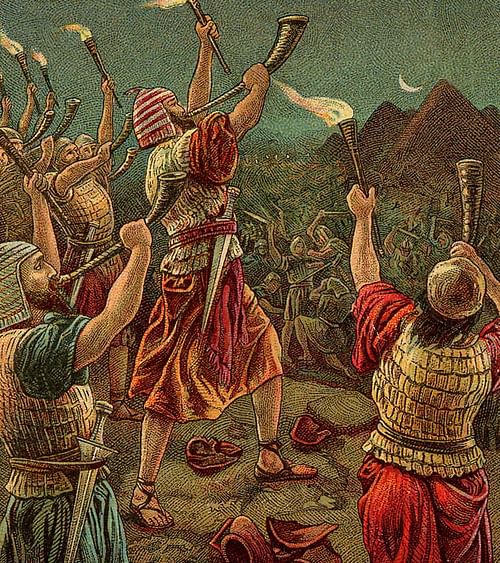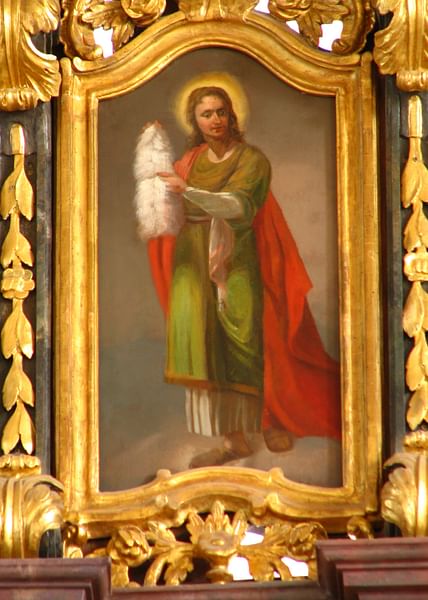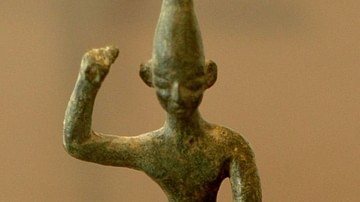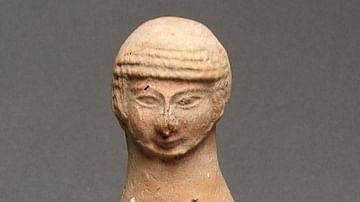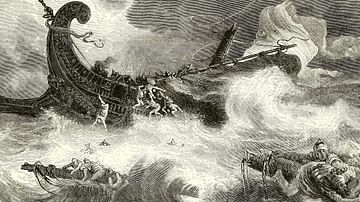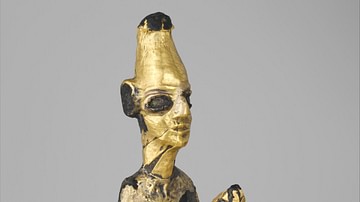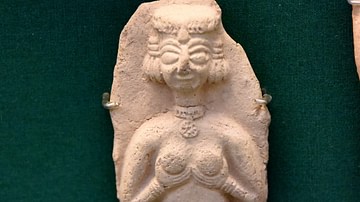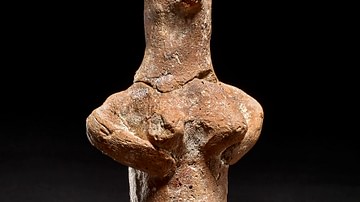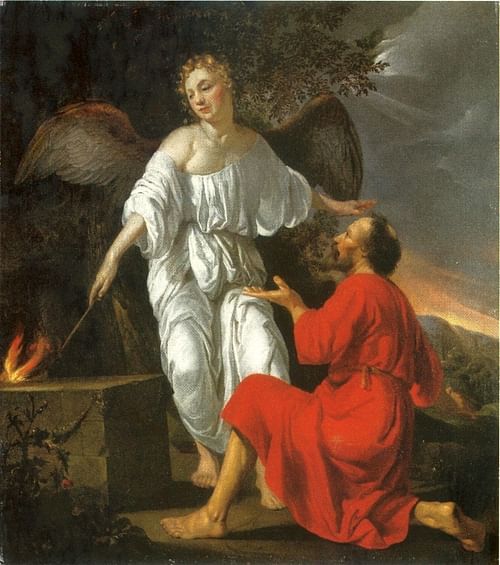
Gideon was a judge and military leader, whose story was recounted in the Biblical Book of Judges. “Judge” (Hebrew, shofet) in this book was not a circuit, court judge, but someone raised up by the God of Israel during a crisis. It is equivalent to a military commander of a region. Gideon was of the tribe of Manasseh (one of the sons of Joseph) but is also given two other names, Jerubbaal, and Jerubbesheth.
Jerubbaal means "Baal will contend," and Jerubbesheth incorporates "shame" in the name. Baal, meaning "lord," was the dominant god of the Canaanite religion among the tribes in the Levant, who was also the god of fertility, storms, and war. His consort was Asherah. The names could have been applied by the cultural intermingling of the Jews with the locals, or to reflect that Gideon contended against Baal in his battles. The various names could reflect several different sources for Gideon that were later merged.
The Book of Judges
The Book of Judges narrates the time when the Jewish settlement in Canaan was ruled by a tribal confederation, where no one tribe dominated control over the others. Historically, this did not last; Judges sets up the background for the next set of books, 1 & 2 Samuel, where David becomes king and centralizes and resolves all the problems.
The Book of Judges demonstrates a consistent pattern: the Jews fall into idolatry and God punishes them with being oppressed by the Canaanites. 'Judge' (Hebrew: shofet) in this book was not a circuit, court judge, but someone raised up by the God of Israel during a crisis. The Jews cry out their sorrow, and God raises up a judge to defeat the current Canaanites. But after a few years, the Jews sin again and the pattern is repeated until the end of the book.
The Call of Gideon
The Israelites fell into idolatry through the witchcraft of a Midianite priest, Aud. He made the sun shine at midnight and convinced the Israelites that the Midianite gods were more powerful than the God of Israel. God then permitted the Midianites to oppress them.
"Where are all his wonders that our ancestors told us about when they said, 'Did not the Lord bring us up out of Egypt?' But now the Lord has abandoned us and given us into the hand of Midian." (Judges 6:13)
God sent an angel in the disguise of a traveler who greeted Gideon: "The Lord is with you, mighty warrior." (Judges 6:12) But Gideon wanted proof that the angel was from God in the form of three miracles:
- fire to shoot out of a rock
- a morning when his fleece was covered in dew, but the rest of the ground was dry
- a morning when the fleece was dry, but the ground was covered in dew
Gideon destroyed an altar to Baal and the symbol of the goddess Asherah with it:
But Joash [Gideon's father] replied to the hostile crowd around him, "Are you going to plead Baal's cause? Are you trying to save him? Whoever fights for him shall be put to death by morning! If Baal really is a god, he can defend himself when someone breaks down his altar. So because Gideon broke down Baal's altar, they gave him the name Jerub-Baal that day, saying, "Let Baal contend with him." (6:31-32).
The Midianites and the Amalekites had crossed the Jordan river and Gideon rallied the tribes to meet them in the Valley of Jezreel. God then told him to send most of them home because the Israelites would claim the upcoming victory as theirs, and not the work of God. There was a strange way of sorting the men. God told Gideon to have the men lap up water.
There the Lord told him, "Separate those who lap the water with their tongues as a dog laps from those who kneel down to drink." Three hundred of them drank from cupped hands, lapping like dogs. All the rest got down on their knees to drink. (Judges 7:5-6)
God told Gideon to send the others away: "With the three hundred men that lapped I will save you and give the Midianites into your hands. Let all the others go home." (Judges 7:7)
Gideon gave each man a trumpet (shofar) and a clay jar with a torch hidden inside. Blowing the trumpets and lighting the torches fooled the Midianites into thinking there was a large force attacking, and so they fled. As the Midianites remarked: "This can be nothing other than the sword of Gideon son of Joash, the Israelite. God has given the Midianites and the whole camp into his hands." (Judges 7:14). Asking for assistance to capture the fleeing Midianites, the towns of Succoth and Peniel refused. Gideon had all the residents of these towns killed.
The Offer of Kingship
The Israelites had been told at Mount Sinai that they were not to be like the other nations, and that included having no kings. However, after the Gideons victory,
The Israelites said to Gideon, "Rule over us—you, your son and your grandson—because you have saved us from the hand of Midian." But Gideon told them, "I will not rule over you, nor will my son rule over you. The Lord will rule over you." (Judges 8:22-23)
After turning down the kingship, Gideon said:
"I do have one request, that each of you give me an earring from your share of the plunder." ... So they spread out a garment, and each of them threw a ring from his plunder onto it. The weight of the gold rings he asked for came to seventeen hundred shekels, b not counting the ornaments, the pendants and the purple garments worn by the kings of Midian or the chains that were on their camels’ necks. Gideon made the gold into an ephod, which he placed in Ophrah, his town. All Israel prostituted themselves by worshiping it there, and it became a snare to Gideon and his family. (Judges 8:24-27)
The Ephod
The ephod remains a debatable topic with scholars. It first appeared in Exodus 28 and Leviticus 8 in describing the vestments of the newly-created position of the high priest. In 1 Samuel 21 and 1 Chronicles 15, it is described as a linen apron that King David first wore when he brought the Ark of the Covenant into Jerusalem. It was later a requirement of the vestments of the Levite priests, with additions perhaps of gold, jewels, and precious gems with the names of the twelve tribes. Its most important function was somehow connected to divination and oracles by priests. It came to be called the breastplate of the high priest, held on by two should straps. Somehow the ephod was connected to a process simply described as Urim and Thummim, lots drawn for oracular purposes (meaning "lights and perfection?"). The concept is known as cleromancy, or divination by lots. In this sense, the ephod could have served as a pocket containing the lots.
Throughout the Jewish scriptures, many stories involve the “drawing of lots,” but without detail. Urim and Thummim are most often mentioned in relation to determining whether someone was guilty of sin. It was understood as God communicating the judgment to the priests through the lots.
Gideon's Death
The death of Gideon is reported in Judges 8:28-30:
"Thus Midian was subdued before the Israelites and did not raise its head again. During Gideon’s lifetime, the land had peace forty years. ... He had seventy sons of his own, for he had many wives."
That the ephod became a snare for Gideon and his family was because after Gideon's lifetime, the Israelites again fell into idolatry:
No sooner had Gideon died than the Israelites again prostituted themselves to the Baals. They set up Baal-Berith as their god and did not remember the Lord their God, who had rescued them from the hands of all their enemies on every side. (Judges 8:34-35)
His son Abimelek murdered some brothers and attempted to become king but failed. The reference to "prostituting themselves to the Baals" reflects the prophetic connection of idolatry and fertility deities to sexual immorality.
Later Traditions
In the New Testament, Gideon is mentioned in line with several past Jewish heroes as a "man of faith" (Hebrews 11). By late antiquity and the Middle Ages, Byzantine iconography often associated Gideon with Mary, the mother of Jesus. The miraculous fleece was equated with the divine substance in her womb, and both Gideon and Mary were greeted by an angel who said, "The Lord is with you."
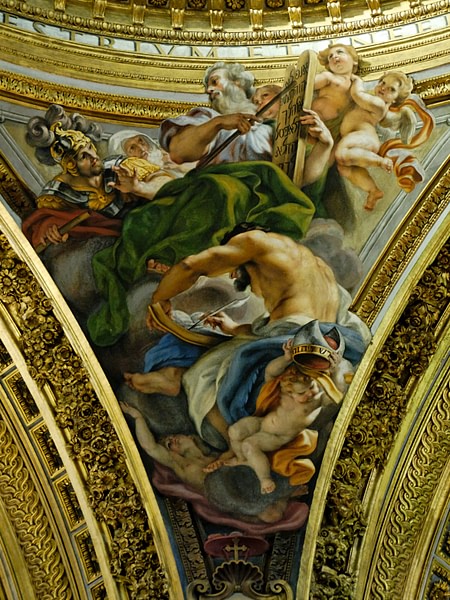
Gideon obtained sainthood in the Eastern Orthodox, Eastern Catholic, and Latin Rite Catholic Churches. During the Protestant Reformation, Gideon's destruction of the altar of Baal was called upon in polemic against the Catholic practice of venerating relics of saints. Mirroring the story of Leonidas I and the 300 Spartans at the Battle of Thermopylae, Gideon symbolizes a small elite force of soldiers against overwhelming odds. The Gideon Force was a British unit in the East Africa campaign in World War II (1939-1945). The 'sword of Gideon' became a metaphor for God's help in a dire situation. Finally, founded in 1899, Gideons International, a group dedicated to Christian evangelism, provides free Gideon Bibles in hotel and motel rooms.
